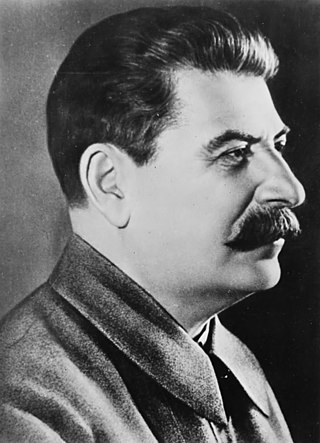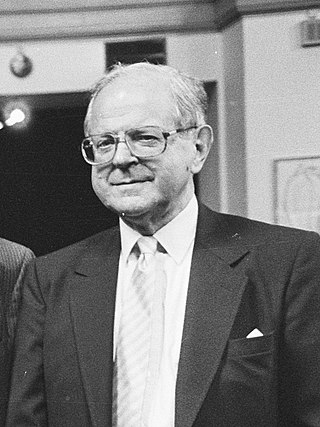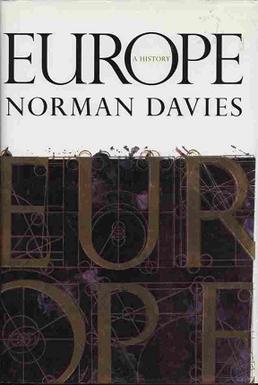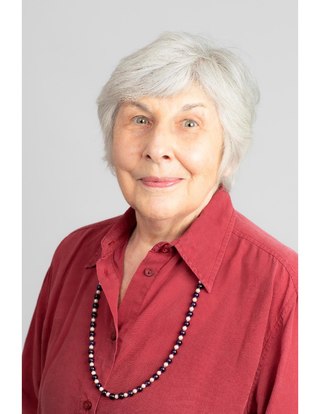Related Research Articles

The Gulag was a system of forced labor camps in the Soviet Union. The word Gulag originally referred only to the division of the Soviet secret police that was in charge of running the forced labor camps from the 1930s to the early 1950s during Joseph Stalin's rule, but in English literature the term is popularly used for the system of forced labor throughout the Soviet era. The abbreviation GULAG (ГУЛАГ) stands for "Гла́вное Управле́ние исправи́тельно-трудовы́х ЛАГере́й", but the full official name of the agency changed several times.

Stalinism is the means of governing and Marxist–Leninist policies implemented in the Soviet Union (USSR) from 1927 to 1953 by dictator Joseph Stalin. Stalin had previously made a career as a gangster and robber, working to fund revolutionary activities, before eventually becoming General Secretary of the Soviet Union. Stalinism included the creation of a one-party totalitarian police state, rapid industrialization, the theory of socialism in one country, forced collectivization of agriculture, intensification of class conflict, a cult of personality, and subordination of the interests of foreign communist parties to those of the Communist Party of the Soviet Union, which Stalinism deemed the leading vanguard party of communist revolution at the time. After Stalin's death and the Khrushchev Thaw, a period of de-Stalinization began in the 1950s and 1960s, which caused the influence of Stalin's ideology to begin to wane in the USSR.

Totalitarianism is a political system and a form of government that prohibits opposition political parties, disregards and outlaws the political claims of individual and group opposition to the state, and controls the public sphere and the private sphere of society. In the field of political science, totalitarianism is the extreme form of authoritarianism, wherein all socio-political power is held by a dictator, who also controls the national politics and the peoples of the nation with continual propaganda campaigns that are broadcast by state-controlled and by friendly private mass communications media.

The Gulag Archipelago: An Experiment in Literary Investigation is a three-volume non-fiction series written between 1958 and 1968 by Russian writer Aleksandr Solzhenitsyn, a Soviet dissident. It was first published in 1973 by the Parisian publisher YMCA-Press, and it was translated into English and French the following year. It explores a vision of life in what is often known as the Gulag, the Soviet labour camp system. Solzhenitsyn constructed his highly detailed narrative from various sources including reports, interviews, statements, diaries, legal documents, and his own experience as a Gulag prisoner.

George Robert Acworth Conquest was a British-American historian, poet, and novelist. He was briefly a member of the Communist Party of Great Britain but later wrote several books against Communism.

The Great Purge, or the Great Terror, also known as the Year of '37 and the Yezhovshchina, was Soviet General Secretary Joseph Stalin's campaign to consolidate his power over the Communist Party of the Soviet Union and Soviet state. The purges also sought to remove the remaining influence of Leon Trotsky. The term great purge, an allusion to the French Revolution's Reign of Terror, was popularized by the historian Robert Conquest in his 1968 book The Great Terror.
The Great Terror: Stalin's Purge of the Thirties is a book by British historian Robert Conquest which was published in 1968. It gave rise to an alternate title of the period in Soviet history known as the Great Purge. Conquest's title was also an evocative allusion to the period that was called the Reign of Terror during the French Revolution. A revised version of the book, called The Great Terror: A Reassessment, was printed in 1990 after Conquest was able to amend the text, having consulted the opened Soviet archives. The book was funded and widely disseminated by Information Research Department, who also published Orwell's list collected by Conquest's secretary Celia Kirwan.
Soviet and communist studies, or simply Soviet studies, is the field of regional and historical studies on the Soviet Union and other communist states, as well as the history of communism and of the communist parties that existed or still exist in some form in many countries, both inside and outside the former Eastern Bloc, such as the Communist Party USA. Aspects of its historiography have attracted debates between historians on several topics, including totalitarianism and Cold War espionage.
The Ryutin affair (1932) was one of the last attempts to oppose the General Secretary Joseph Stalin within the All-Union Communist Party (b).
Throughout the history of the Soviet Union, tens of millions of people suffered political repression, which was an instrument of the state since the October Revolution. It culminated during the Stalin era, then declined, but it continued to exist during the "Khrushchev Thaw", followed by increased persecution of Soviet dissidents during the Brezhnev era, and it did not cease to exist until late in Mikhail Gorbachev's rule when it was ended in keeping with his policies of glasnost and perestroika.
Kremlinology is the study and analysis of the politics and policies of the Soviet Union while Sovietology is the study of politics and policies of both the Soviet Union and former communist states more generally. These two terms were synonymous until the dissolution of the Soviet Union. In an extended usage, Kremlinology is sometimes used to mean any attempt to understand a secretive organization or process, such as plans for upcoming products or events, by interpreting indirect clues.

Europe: A History is a 1996 narrative history book by Norman Davies.

Dekulakization was the Soviet campaign of political repressions, including arrests, deportations, or executions of millions of kulaks and their families. Redistribution of farmland started in 1917 and lasted until 1933, but was most active in the 1929–1932 period of the first five-year plan. To facilitate the expropriations of farmland, the Soviet government announced the "liquidation of the kulaks as a class" on 27 December 1929, portraying kulaks as class enemies of the Soviet Union.

Sheila Mary Fitzpatrick is an Australian historian, whose main subjects are history of the Soviet Union and history of modern Russia, especially the Stalin era and the Great Purges, of which she proposes a "history from below", and is part of the "revisionist school" of Communist historiography. She has also critically reviewed the concept of totalitarianism and highlighted the differences between Nazi Germany and the Soviet Union in debates about comparison of Nazism and Stalinism.

Mass killings under communist regimes occurred through a variety of means during the 20th century, including executions, famine, deaths through forced labour, deportation, starvation, and imprisonment. Some of these events have been classified as genocides or crimes against humanity. Other terms have been used to describe these events, including classicide, democide, red holocaust, and politicide. The mass killings have been studied by authors and academics and several of them have postulated the potential causes of these killings along with the factors which were associated with them. Some authors have tabulated a total death toll, consisting of all of the excess deaths which cumulatively occurred under the rule of communist states, but these death toll estimates have been criticized. Most frequently, the states and events which are studied and included in death toll estimates are the Holodomor and the Great Purge in the Soviet Union, the Great Chinese Famine and the Cultural Revolution in the People's Republic of China, and the Cambodian genocide in Democratic Kampuchea.
On the Cult of Personality and Its Consequences, popularly known as the Secret Speech, was a report by Soviet leader Nikita Khrushchev, First Secretary of the Communist Party of the Soviet Union, made to the 20th Congress of the Communist Party of the Soviet Union on 25 February 1956. Khrushchev's speech was sharply critical of the rule of the deceased General Secretary and Premier Joseph Stalin, particularly with respect to the purges which had especially marked the last years of the 1930s. Khrushchev charged Stalin with having fostered a leadership cult of personality despite ostensibly maintaining support for the ideals of communism. The speech was leaked to the West by the Israeli intelligence agency Shin Bet, which received it from the Polish-Jewish journalist Wiktor Grajewski.
Soviet democracy, or council democracy, is a type of democracy in Marxism, in which the rule of the population is exercised by directly elected soviets, or workers' councils. The councils are directly responsible to their electors and bound by their instructions using a delegate model of representation. Such an imperative mandate is in contrast to a trustee model, in which the elected delegates are only responsible to their conscience. Delegates may accordingly be dismissed from their post at any time or be voted out (recall).

Estimates of the number of deaths attributable to the Soviet revolutionary and dictator Joseph Stalin vary widely. The scholarly consensus affirms that archival materials declassified in 1991 contain irrefutable data far superior to sources used prior to 1991, such as statements from emigres and other informants.
This is a select bibliography of post-World War II English-language books and journal articles about Stalinism and the Stalinist era of Soviet history. Book entries have references to journal reviews about them when helpful and available. Additional bibliographies can be found in many of the book-length works listed below.

Stalin: Breaker of Nations is a biography of Joseph Stalin by author and historian Robert Conquest. It was published in 1991 by Weidenfeld and Nicolson and Penguin Books.
References
- ↑ Date information sourced from Library of Congress Authorities data, via corresponding WorldCat Identities linked authority file (LAF) .
- ↑ "Faculty page". History.ucla.edu. University of Los Angeles, California. Retrieved 27 August 2016.
- ↑ Sarah Davies; James Harris (8 September 2005). "Joseph Stalin: Power and Ideas". Stalin: A New History. Cambridge University Press. p. 3. ISBN 978-1-139-44663-1.
Academic Sovietology, a child of the early Cold War, was dominated by the 'totalitarian model' of Soviet politics. Until the 1960s it was almost impossible to advance any other interpretation, in the USA at least.
- ↑ Sarah Davies; James Harris (8 September 2005). "Joseph Stalin: Power and Ideas". Stalin: A New History. Cambridge University Press. pp. 3–4. ISBN 978-1-139-44663-1.
In 1953, Carl Friedrich characterised totalitarian systems in terms of five points: an official ideology, control of weapons and of media, use of terror, and a single mass party, 'usually under a single leader'. There was of course an assumption that the leader was critical to the workings of totalitarianism: at the apex of a monolithic, centralised, and hierarchical system, it was he who issued the orders which were fulfilled unquestioningly by his subordinates.
- ↑ Sarah Davies; James Harris (8 September 2005). "Joseph Stalin: Power and Ideas". Stalin: A New History. Cambridge University Press. pp. 4–5. ISBN 978-1-139-44663-1.
Tucker's work stressed the absolute nature of Stalin's power, an assumption which was increasingly challenged by later revisionist historians. In his Origins of the Great Purges, Arch Getty argued that the Soviet political system was chaotic, that institutions often escaped the control of the centre, and that Stalin's leadership consisted to a considerable extent in responding, on an ad hoc basis, to political crises as they arose. Getty's work was influenced by political science of the 1960s onwards, which, in a critique of the totalitarian model, began to consider the possibility that relatively autonomous bureaucratic institutions might have had some influence on policy-making at the highest level.
- 1 2 3 Lenoe, Matt (2002). "Did Stalin Kill Kirov and Does It Matter?". The Journal of Modern History. 74 (2): 352–380. doi:10.1086/343411. ISSN 0022-2801. S2CID 142829949.
- 1 2 3 Sarah Davies; James Harris (8 September 2005). Stalin: A New History. Cambridge University Press. pp. 3–5. ISBN 978-1-139-44663-1.
- 1 2 Sheila, Fitzpatrick (2007). "Revisionism in Soviet History". History and Theory. 46 (4): 77–91. doi:10.1111/j.1468-2303.2007.00429.x. ISSN 1468-2303.
... the Western scholars who in the 1990s and 2000s were most active in scouring the new archives for data on Soviet repression were revisionists (always 'archive rats') such as Arch Getty and Lynne Viola.
- 1 2 3 4 Karlsson, Klas-Göran (2008). "Revisionism". In Karlsson, Klas-Göran; Schoenhals, Michael. Crimes Against Humanity Under Communist Regimes – Research Review. Stockholm: Forum for Living History. pp. 29–36. ISBN 9789197748728.
- ↑ Getty, J. Arch (1991). "State and Society Under Stalin: Constitutions and Elections in the 1930s". Slavic Review. 50 (1): 18–35. JSTOR 2500596.
- ↑ John Earl Haynes; Harvey Klehr (1 January 2003). In Denial: Historians, Communism, & Espionage . Encounter Books. pp. 15–17. ISBN 978-1-893554-72-6.
- ↑ Coplon, Jeff (12 January 1988). "In Search of a Soviet Holocaust". Village Voice. Retrieved 30 November 2020– via Montclair State University.
- 1 2 Getty, J. Arch (22 January 1987). "Starving the Ukraine". The London Review of Books. 9 (2): 7–8. Retrieved 24 September 2015.
- ↑ Getty, Arch; Rittersporn, Gábor; Zemskov, Viktor (1993). "Victims of the Soviet Penal System in the Pre-War Years: A First Approach on the Basis of Archival Evidence" (PDF). American Historical Review . 98 (4): 1017–1049. doi:10.2307/2166597. JSTOR 2166597 . Retrieved 30 November 2020.
- ↑ Getty, J. Arch; Rittersporn, Gábor; Zemskov, Viktor (1993). "Victims of the Soviet penal system in the pre-war years: a first approach on the basis of archival evidence" (PDF). American Historical Review . 98 (4): 1017–1049. doi:10.2307/2166597. JSTOR 2166597.
The long-awaited archival evidence on repression in the period of the Great Purges shows that levels of arrests, political prisoners, executions, and general camp populations tend to confirm the orders of magnitude indicated by those labeled as 'revisionists' and mocked by those proposing high estimates.
- ↑ Wheatcroft, Stephen G. (1999). "Victims of Stalinism and the Soviet Secret Police: The Comparability and Reliability of the Archival Data. Not the Last Word" (PDF). Europe-Asia Studies . 51 (2): 340–342. doi:10.1080/09668139999056.
For decades, many historians counted Stalin' s victims in 'tens of millions', which was a figure supported by Solzhenitsyn. Since the collapse of the USSR, the lower estimates of the scale of the camps have been vindicated. The arguments about excess mortality are far more complex than normally believed. R. Conquest, The Great Terror: A Re-assessment (London, 1992) does not really get to grips with the new data and continues to present an exaggerated picture of the repression. The view of the 'revisionists' has been largely substantiated (J. Arch Getty & R. T. Manning (eds), Stalinist Terror: New Perspectives (Cambridge, 1993)). The popular press, even TLS and The Independent, have contained erroneous journalistic articles that should not be cited in respectable academic articles.